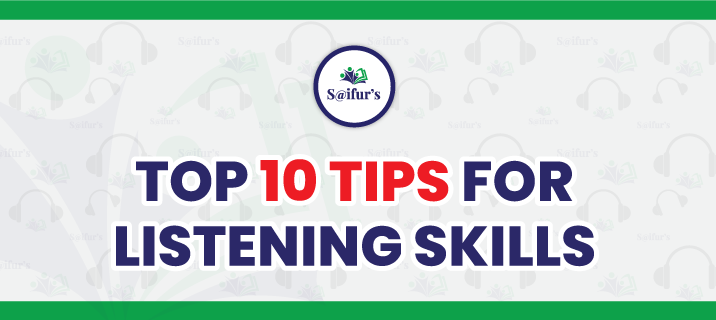

Blog Details

Phonetics or accurate pronunciation is an important part of learning the English language. Non-native English speakers are sometimes harder to understand as their phonetics is not up to the standard. Even people with great vocabulary and perfect knowledge of English grammar can sometimes mess up the pronunciation of a simple word. This happens because often you cannot guess the proper pronunciation of an English word from the spelling of the word.
That’s why we are going to discuss ‘Top 10 Phonetics Tips’ in this article so that you can pronounce English words better.
The best way to improve phonetics is to listen to genuine or authentic speech. If you listen to native English speakers when they speak, you will get a clear idea of how the words sound. Therefore, you will be able to properly pronounce English words yourself. You can watch an English movie in its original form, listen to a podcast or YouTube video as examples of authentic speech. Pay close attention to how native speakers pronounce certain words, and then try it yourself!
The only way to make words properly is to use your mouth and lips. To make certain sounds your mouth and lips must move in a certain way. If you want to ensure that you are pronouncing the words correctly, you must first ensure that you are moving your mouth and lips in the correct way. That’s why you should pay attention to your mouth and lips movements when you talk. Check your mouth and lips movements in the mirror to make sure that you are doing it right.
Another body part that you must keep track of for good phonetics is you tongue. The main difference between many sounds is just the tongue. Such as, between the word ‘Light’ and the word ‘Right’, the only difference is how your tongue moves. Therefore, if you want to be proficient in English phonetics and learn how to pronounce English words properly, you must learn the proper tongue movements. To ensure that your tongue movements are correct while talking, you can practice in front of a mirror and check your tongue movements.
An important part of learning proper English phonetics is to learn about minimal pairs. But, what are minimal pairs? A minimal pair is two words that differ by only a single sound. That means, minimal pair words have almost the exact same pronunciation, but with the exception of one sound.
For example, Wet and Wait. Wet is pronounced with /e/ whereas, wait is pronounced with /eɪ/. For non-native English speakers, this can be hard to understand at first. The only solution to this problem is to listen carefully, and take note of all the minimal pairs you come across.
Learning English words doesn’t only mean learning their spelling or pronunciations, you must also know the word stress. In English, some words are more stressed than others, and different words have stresses in different places.
For example, in deMOcracy and CLArity, here the stress is put on ‘mo’ and ‘cla’ respectively. You can learn the proper stress by listening to native English speakers. Putting appropriate stresses in the appropriate places is the best way to learn English phonetics.
Nowadays, in the age of Internet, we don’t use the dictionary often. However, the dictionary is a perfect tool that can help you to learn proper phonetics. You can either use a physical printed dictionary where you can learn the phonetic transcription of a word, or you can use an online dictionary. By using an online dictionary you can listen to the proper pronunciation of a word, and practice proper phonetics.
One of the best ways to learn proper phonetics is from the phonemic chart. International Phonetic Alphabet or IPA is a visual representation of different sounds. However, this alphabet might seem a bit strange to you at the first glance. But with the help of a phonemic chart, you will be able to learn the proper pronunciation of every English word.
We all know that it is impossible to guess the correct pronunciation of an English word from the spelling alone. Therefore, consulting a phonemic chart to know the proper pronunciation is the best solution.
Even after following all the tips you may still face problems with some words. However, don’t get disappointed with yourself if that happens. Instead, use this opportunity to identify your weak spots, and try to fix the problem. You can do that by breaking down difficult words into their individual sounds or syllables. This way the pronunciation of a difficult word will become easier for you.
You have learned all the techniques of proper phonetics and now it is time for practice. ‘Practice makes perfect’, you must have heard this saying, so the more you practice the more your phonetics will improve. Listen to yourself when you talk, note down your weak spots and mistakes, and try the various techniques mentioned above to correct your mistakes. Repeat this process until you feel confident in your phonetics skills.
However, practising phonetics alone is not enough. We are not always able to identify or pinpoint our own mistakes. So, get yourself a practising partner. They can themselves be proficient English speakers or just a learner like you. The most important thing is that they will be able to identify your mistakes or weak spots easily and give you valuable feedback.
Finally, don’t get discouraged if you have weak spots or you make mistakes. Remember the more mistakes you make, the more you will learn. Give each of these tips a go and keep practising to achieve success.

Top 10 Tips for Phonetics
By Farjana Nasrin
Top 10 Tips for PhoneticsPhonetics or accurate pronunciation is an important part of learning the English language. Non-native English speakers ar ...
view more
Top 10 Tips for Listening Skills
By Farjana Nasrin
Top 10 Tips for Listening SkillsListening skill building is a vital part of learning any language. You cannot call yourself an expert or proficien ...
view more
Top 100 Verbs You should Know for E ...
By Farjana Nasrin
Top 100 Verbs You Should Know for EnglishVerbs are probably the most important English language words that an English speaker must know. In every ...
view more